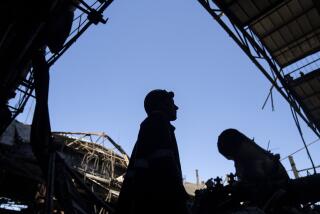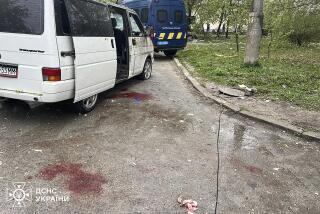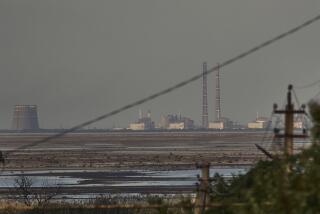14 Years On, the Toll Still Grows
The worldâs worst peacetime nuclear disaster began at 1:26 a.m. on April 26, 1986, when one of four power reactors at Chernobyl in Ukraine exploded, spewing into the atmosphere many times the amount of radioactive material released by the atomic bombings of Hiroshima and Nagasaki. Ukraine and its neighbors are still paying the price.
This week Ukrainian President Leonid D. Kuchma said he will meet his commitment to shut down the remaining Chernobyl reactors. Dec. 15 is the target date. President Clinton, who was visiting Ukraine, pledged $78 million to help rebuild the leaking concrete and steel structure erected to seal off the ruined reactor. At a meeting in Berlin next month the United States will press other major nations to help finance construction of two new reactors in Ukraine. Given the corruption in Kuchmaâs regime, international scrutiny is a must.
Chernobylâs full consequences have yet to unfold. The reactor explosion, which followed an ill-conceived test that temporarily cut off the safety system, polluted millions of acres with tons of radioactive strontium, cesium and plutonium. The Soviet Union, of which Ukraine was then a part, initially tried to hide the scale of the disaster. It acknowledged only 31 deaths in the weeks that followed. In fact much of western Russia, Ukraine, Belarus and Europe were exposed to fallout. Several thousand deaths have been attributed to the accident, and that may be only the beginning. An estimated 800,000 âliquidatorsâ mobilized by the Communist Party for cleanup operations in the Soviet Union were exposed to high levels of radiation. Cases of thyroid cancer in children living downwind from the plant are rising. Since cancer typically has a long incubation period, a 1995 U.N. report warned, the tragedy could have many years to run.
The backlash to Chernobyl was dramatic. By the end of 1990 the Kremlin suspended construction on nearly all nuclear power plants. Sweden accelerated its timetable for phasing out nuclear power, while Italy halted work on new nuclear plants. The political effect of Chernobyl was also far-reaching. In 1991 Soviet President Mikhail S. Gorbachev admitted that the disaster had been a âturning pointâ toward greater openness--toward the glasnost that, though Gorbachev could not imagine it at the time, helped lead to the end of the Soviet Union.
More to Read
Sign up for Essential California
The most important California stories and recommendations in your inbox every morning.
You may occasionally receive promotional content from the Los Angeles Times.









